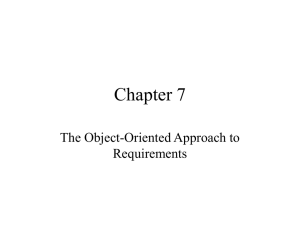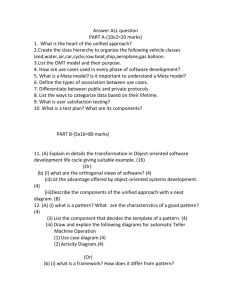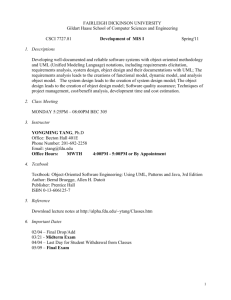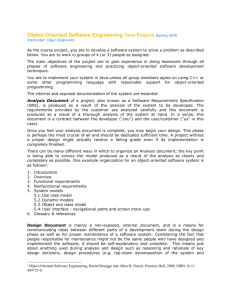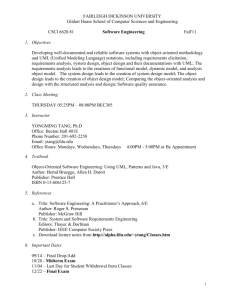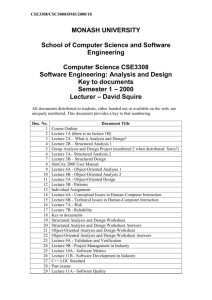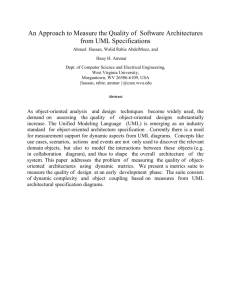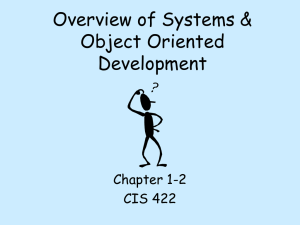OOSE - Isra University
advertisement
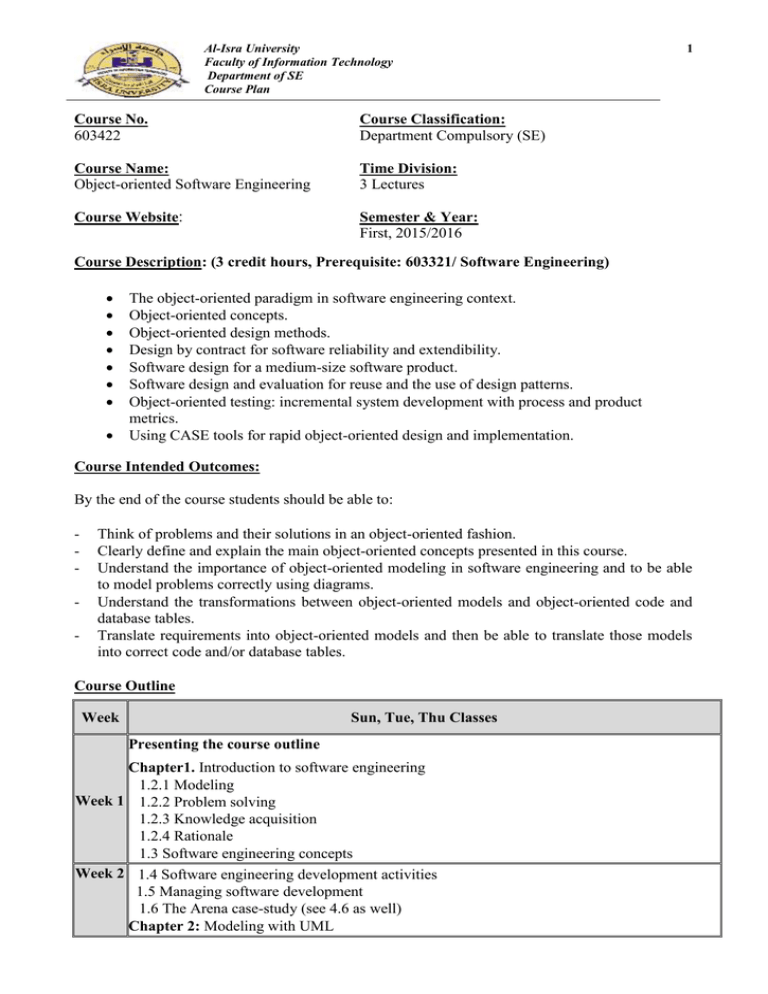
Al-Isra University Faculty of Information Technology Department of SE Course Plan Course No. 603422 Course Classification: Department Compulsory (SE) Course Name: Object-oriented Software Engineering Time Division: 3 Lectures Course Website: Semester & Year: First, 2015/2016 1 Course Description: (3 credit hours, Prerequisite: 603321/ Software Engineering) The object-oriented paradigm in software engineering context. Object-oriented concepts. Object-oriented design methods. Design by contract for software reliability and extendibility. Software design for a medium-size software product. Software design and evaluation for reuse and the use of design patterns. Object-oriented testing: incremental system development with process and product metrics. Using CASE tools for rapid object-oriented design and implementation. Course Intended Outcomes: By the end of the course students should be able to: - Think of problems and their solutions in an object-oriented fashion. Clearly define and explain the main object-oriented concepts presented in this course. Understand the importance of object-oriented modeling in software engineering and to be able to model problems correctly using diagrams. Understand the transformations between object-oriented models and object-oriented code and database tables. Translate requirements into object-oriented models and then be able to translate those models into correct code and/or database tables. Course Outline Week Sun, Tue, Thu Classes Presenting the course outline Chapter1. Introduction to software engineering 1.2.1 Modeling Week 1 1.2.2 Problem solving 1.2.3 Knowledge acquisition 1.2.4 Rationale 1.3 Software engineering concepts Week 2 1.4 Software engineering development activities 1.5 Managing software development 1.6 The Arena case-study (see 4.6 as well) Chapter 2: Modeling with UML Al-Isra University Faculty of Information Technology Department of SE Course Plan 2 2.2 An overview of UML 2.3 Modeling concepts. 2.4.1 Use case diagrams Week 3 - Case study 2.4.2 Class diagrams Week 4 2.4.2 Class diagrams (continue) - Case study 2.4.3 Interaction diagrams 2.4.4 Statechart diagrams 2.4.5 Activity diagrams - Case study Week 5 Chapter 4: Requirements elicitation 4.2 Overview 4.3 Concepts 4.4 Requirements elicitation activities - Case study First Exam Week 6 Chapter 5: Analysis 5.3 Analysis concepts 5.4 Analysis activities Week 7 5.4 Analysis activities(continue) Chapter 6: System design: Decomposing the system 6.3 System design concepts Week 8 6.4 System design activities -Case study Week 9 Second Exam Chapter 8: Object Design: Reusing Pattern Solutions 8.2 An overview of Object design 8.3 Reuse concepts Week 10 8.4 Reuse activities Chapter 9: Object design: Specifying interfaces 9. 2 An overview 9.3 Interface specification concepts Week 11 9.3 Interface specification concepts(continue) Al-Isra University Faculty of Information Technology Department of SE Course Plan Week Return and Discussion of 12 Second Exam results 9.4 Interface specification activities 9.4 Interface specification activities Chapter 10: Mapping models to code 10.2 An overview of mapping 10.3 Mapping concepts Week 13 Week 14 10.4 Mapping activities 10.6 Arena case study Review Final Exams Textbook - Object-Oriented Software Engineering Using UML, Patterns, and Java, 3nd Edition 2010, Bernd Bruegge and Allen H. Dutoit. Suggested references 1. Object-Oriented Software Engineering: Practical Software Development using UML and Java, 2rd Edition 2009, Timothy C. Lethbridge and Robert Laganière. 2. Object Oriented Software Engineering: A Use Case Driven Approach, Ivar Jacobson. 3. Design Patterns: Elements of Reusable Object-Oriented Software, Erich Gamma et. al. 4. Object Oriented Software Development Using Java, 2nd 2002 by Xiaoping Jia. 5. Object-oriented Software Engineering, 1st Edition 2007, Stephen R. Schach. Marking First Exam Second Exam Activity Final Exam 25 marks 25 marks 10 marks 40 marks Regulations 1. 2. 3. 4. There will be three term exams given during this semester. The best two out of three will be considered for the First and Second Exam. This means: there will be NO makeup exams! Missing one of the two left exams means a ZERO grade will be given for that exam. There will NOT be any makeup for quizzes Attendance is mandatory and University regulations will be enforced. All Cheating incidents will be reported to the chair. The following activities are considered cheating: a. Turning in assignment that includes parts of someone else's work. b. Turning in someone else’s assignment as your own. c. Giving assignment to someone else to turn in as their own. d. Copying answers in a test or quiz. e. Taking a test or quiz for someone else. 3 Al-Isra University Faculty of Information Technology Department of SE Course Plan 4 f. Having someone else take a test or quiz for you. 5. See Student handbook for other regulations. Assignments and/or Projects Assignments / Projects H.W.1 H.W.2 Quizzes Description Due Date Marking To be specified in due course To be specified in due course Four or more quizzes To be specified in due course To be specified in due course Spread throughout the duration of the course 2 marks 2 marks 6 marks Emailing Guidelines: 1. 2. 3. 4. All homework, assignments, projects, etc., are sent by email to the email address shown below ( under Instructor’s Information). Be sure to send them before the due date. Fill in the subject field of the email using the following format: CS301_Family-Name_First-Name_Subject , where: a) CS301 is abbreviation for the course. Other courses should have similar abbreviations b) Family-Name and First-Name are replaced by your family name and your first name. c) Subject is replaced by the title of the assignment, project, etc. You may also use the email to ask questions about the course. In this case, just type the world “question” in the place of _Subject as described in 3-c above. Instructors' information Section: 2 Lecture Room: 4139 Instructor's Name: Dr. Osama Qtaish Email: osama.qtaish@iu.edu.jo Time: 10-11:00 Office No.: 41304130230 Office Hours: [Sun, Tue, Thu 11:00 -1:00] [ Mon, Wed 3:30-4:00] Other office hours are available by appointment Important: The content of this syllabus may not be changed during the current semester. Instructor Council Chair
